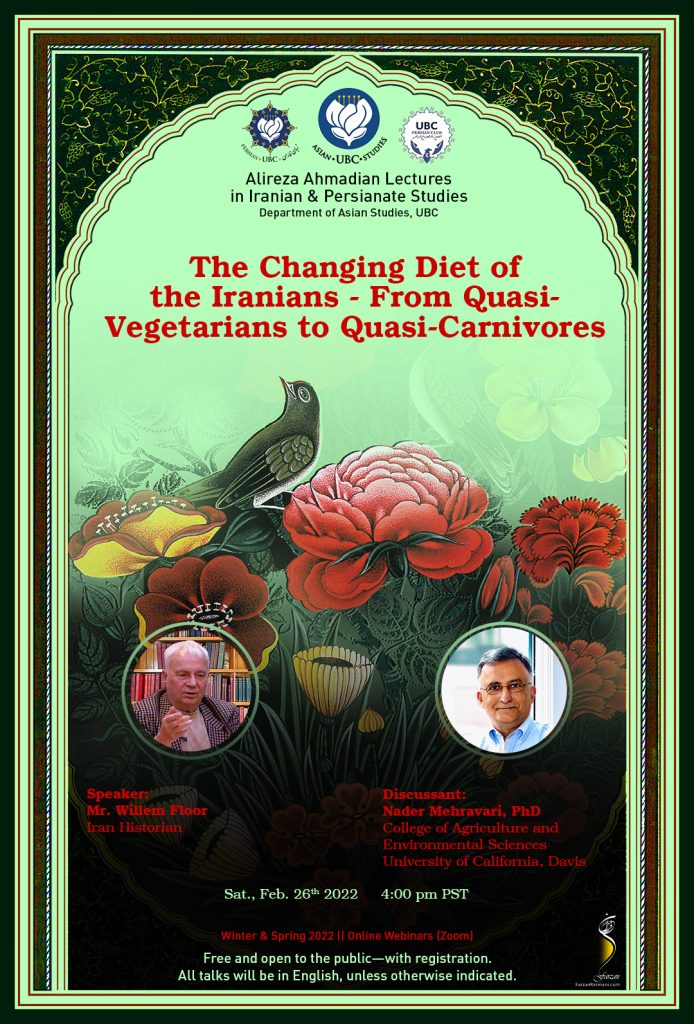

Poster design by Farzan Kermani
تغییر رژیم غذایی ایرانیان: از شبهگیاهخواری به شبهگوشتخواری
سخنران: دکتر ویلِم فلور، ایرانشناس، محقق مستقل
طرفبحث: دکتر نادر مهرآوری، کالج علوم کشاورزی و محیط زیست، دانشگاه کالیفرنیا، دیویس
تا قرن بیستم تغییر چندانی در رژیم غذایی ایرانیان ایجاد نشد. نان غذای اصلی بود و در کنار آن سبزیجات، میوه، ماست و آجیل مصرف میشد. برای اکثر مردم، گوشت و برنج یک غذای لوکس بود. در قرن نوزدهم و بیستم ایرانیان شروع به استفاده از مواد غذایی جدید کردند. پس از سال ۱۹۷۰، رژیم غذایی ایرانیان تغییر میکند. رژیم غذایی جدید شامل مقادیر زیادی برنج سفید، گوشت، نوشیدنیها و شیرینی/دسرهای شیرینشده با شکر، با مقدار کمی سبزیجات، آجیل یا میوه بود؛ مشابه رژیم غذایی در ایالات متحده، با همان مشکلات برای سلامتی.
The event recording is now available:
The Alireza Ahmadian Lecture in Iranian and Persianate Studies present: The Changing Diet of the Iranians – From Quasi-Vegetarians to Quasi-Carnivores on February 26, 2022.
Until the 20th century there was little change in the diet of Iranians. Bread was the major staple, accompanied by vegetables, fruits, yoghurt, and nuts. Meat and rice were a luxury food for most consumers. In the 19th and 20th century new food items were adopted by Persian consumers. After 1970, the modern Iranian diet—large amounts of white rice, meats, sugar-sweetened beverages and sweet/desserts, with few vegetables, herbs, nuts or fruits—grows increasingly similar to the US diet with the same health problems.
Guest Speaker
Willem Floor studied development economics and non-western sociology, as well as Persian, Arabic and Islamology from 1963-67 at the University of Utrecht (the Netherlands). He received his doctoral degree from the University of Leiden in 1971. Since 1983, Dr. Floor was employed by the World Bank as an energy specialist, however, after his retirement in 2002, he has dedicated his time to the study of the social and political history of Iran, and has published extensively throughout this time. His books include: Public Health in Qajar Iran, Agriculture in Qajar Iran, and The History of Theater in Iran, as well as, The Persian Gulf: A Political and Economic History of 5 Port Cities, 1500-1730, its second volume, Persian Gulf: The Rise of the Gulf Arabs, 1747-1792, third volume, The Rise and Fall of Bandar-e Lengeh, the fourth volume, Bandar Abbas: The Natural Gateway of Southeast Iran, and the fifth volume, The Persian Gulf: Links with the Hinterland Bushehr, Borazjan, Kazerun, Banu Ka’b, & Bandar Abbas, The Persian Gulf: The Hula Arabs of The Shibkuh Coast of Iran, and The Persian Gulf: Dutch-Omani Relations A Commercial & Political History 1651-1806, and The Persian Gulf: Muscat – City, Society and Trade . He has also published, Travels Through Northern Persia, 1770-1774, Titles and Emoluments in Safavid Iran, and A Social History of Sexual Relations in Iran; Labor and Industry in Iran, 1850-1941; Guilds, Merchants and Ulama in 19th Century Iran; The Rise and Fall of Nader Shah; Games Persians Play, and History of Bread in Iran. His translations include: Samuel Gottlieb Gmelin’s Travels Through Northern Persia 1770–1774 , and with Hasan Javadi, Abbas Qoli Aqa Bakikhanov’s The Heavenly Rose-Garden: A History of Shirvan & Daghestan; Evliya Chelebi’s Travels in Iran and the Caucasus, 1647 and 1654; A Man of Two Worlds: Pedros Bedik in Iran, 1670–1675, Awake: A Moslem Woman’s Rare Memoir of Her Life and Partnership with the Editor of Molla Nasreddin, the Most Influential Satirical Journal of the Caucasus and Iran, 1907–1931, and Engelbert Kaempfer: Exotic Attractions in Persia, 1684–1688: Travels & Observations.
Discussant
Nader Mehravari has been studying the principles and practices of Persian cookery for the past 30 years – initially as a serious side activity and now, post-retirement, fulltime. His current research interests include historical, cultural, and social practices relating to the preparation and consumption of food within the global Iranian diaspora community. He puts his research into practice by recreating traditional and authentic Persian dishes in a modern, western home kitchen, while carefully documenting associated methods behind individual and classes of dishes. He aims to create an innovative cookbook where accurate historical information and modern food science techniques are compiled for modern western home kitchens. His academic and professional background is in science, engineering, and technology which allows him to incorporate a structured and scientific approach into his culinary passion. He received his PhD from Cornell University in 1982. He is a retired corporate executive, has taught at Cornell, Syracuse, and Princeton Universities, and has published extensively. He is currently a Research Associate at the College of Agriculture and Environmental Sciences of University of California, Davis. He also volunteers at the Center for Iranian Diaspora Studies at San Francisco State University.
Should you have any questions, please contact the Department of Asian Studies at Asian.Studies@ubc.ca.